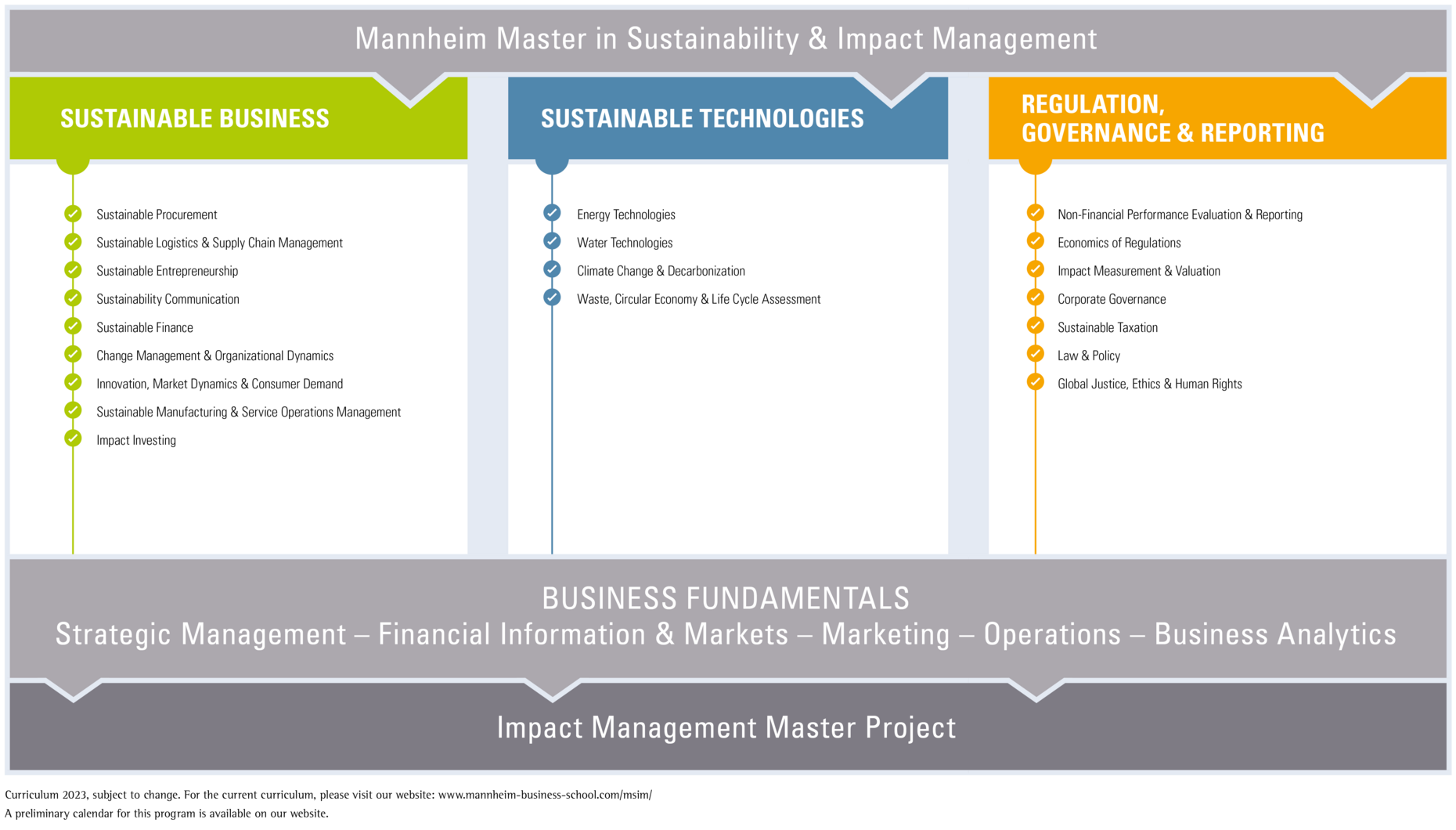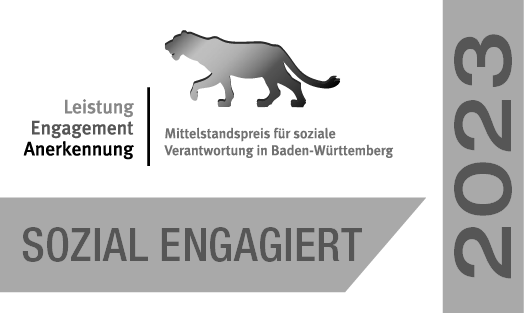Program Structure
You are here: Programs & Courses » Master's Programs » Mannheim Master in Sustainability & Impact Management (Part-Time/Blended) » Program Structure
Holistic and Impactful Learning
The holistic approach of the Mannheim Master in Sustainability and Impact Management guarantees that impact management will become an integral element of all operational areas of the company.
We have devised a program structure and course contents that will provide impactful learning.
Participants become proficient in essential management skills with a specific focus on challenges of the future like sustainable impact management in an increasingly digitalized environment. Insights into current best practices from various companies and industries as well as personal skills courses round off the program.
An Overview of the Program Structure
The Mannheim Master in Sustainability and Impact Management is organized in modules that build on each other over a period of 24 months. This allows you to retain full-time employment throughout the program and apply your newly acquired knowledge directly at your workplace. (Click to enlarge the chart)
Business Fundamentals
The Business Fundamentals segments are an integral part of the program. They will effectively guarantee that:
- all students at Mannheim Business School have basic business knowledge
- there is a stable foundation of academic findings for all Master’s programs
- all participants comprehend and develop a general understanding of the discipline.
They moreover provide basic knowledge for later more specialized courses.
Sustainability and Impact Management Master Project
Working in a team with your fellow students, you will apply the knowledge and methodologies acquired throughout your studies in a hands-on project for one of our partner companies.
Personal Skills
Essential program elements such as the Sustainability and Impact Management Master Project require that you work with classmates in heterogeneous teams, just as you would at your workplace. Personal skills courses (e.g. presentation skills, agile methods, etc.) foster the necessary key qualities you need for management positions.
Workshops
The program includes regular workshops where participants can take a deep dive into current topics and practical challenges. These events further provide room for networking and exchange of knowledge. Over and above individual learning, we aim to create a community that fosters peer learning.
The Course Contents in Detail
Make an impact. Please find a detailed description of exemplary courses of the Mannheimer Master in Sustainability and Impact Management below.

SUSTAINABLE BUSINESS
Sustainable Procurement
- tba
Sustainable Logistics & Supply Chain Management
- tba
Sustainable Entrepreneurship
Over the recent year, the traditional distinction between for profit and non-profit organization has been shifted to allow for a new variety of organizations in between. Specifically, social entrepreneurs have increasingly set out to use market-based business models to solve social or environmental issues and make a positive impact. Further, social intrapreneurs are increasingly contributing to the sustainability transformation of large organizations with some companies even setting up structured programs to support them.
Learning Goals – In this course, participants...
- Gain an understanding of the concept and role of social entrepreneurship and intrapreneurship;
- Learn about the ways in which entrepreneurship can contribute to various sustainability domains;
- And critically discuss the political and institutional developments around varying forms of organizations.
Sustainability Communication
Sustainability communication can be a double-edged sword. On the one hand, stakeholders want to be informed about an organizations‘ impacts. On the other hand, talking too much about one‘s own sustainability achievements may lead to perceptions of greenwashing and trigger stakeholders‘ skepticism. Further, new communication pathways, e.g., via social media offer avenues for two way communication and dialogue which so far, remains underexplored by many organizations.
Learning Goals – In this course, participants...
- gain knowledge about the basic approaches to effective sustainability communication;
- reflect on potential threats of wrongly designed sustainability communications;
- and discuss current developments and trends with regard to sustainability communication methods.
Sustainable Finance
The European Action Plan for Financing Sustainable Growth, or Sustainable Finance Action Plan, focuses on the Environment, Social and Governance (ESG) fields of activity in order to achieve sustainability goals together with the financial sector.
This is also accompanied by binding legal requirements for companies. The EU taxonomy, for example, represents a uniform classification system for sustainable economic activities and investments for six defined environmental objectives.
Learning Goals – In this course, participants...
- acquire basic knowledge about foundations of sustainable finance;
- they learn to understand how ESG data can be applied to evaluate the sustainability of investments;
- and they critically discuss the current and prospective developments in financial markets.
Change Management & Organizational Dynamics
Making an organization more sustainable oftentimes means introducing change to the organization which may lead to resistance. Such change processes have to be carefully designed and managed to be effective and managers need to have a clear understanding of stakeholder attitudes and organizational dynamics.
Learning Goals – In this course, participants...
- learn the basic theoretical concepts with regard to organizational change management;
- engage in discussions about the potential implications of sustainability-related change on organizations and their employees;
- and gain insights into methods that can be applied to successfully manage such transformations while engaging the organizational members.
Innovation, Market Dynamics, and Consumer Demand
Markets are key drivers of sustainability and an increasing consumer demand for sustainable products has led to mainstream retailers including sustainable products into their portfolios. At the same time, in many industries, what consumers report in surveys with regards to their sustainability attitudes differs greatly from what they really do at the checkout (referred to as the consumer paradox). Companies for instance frequently complain about a lack of willingness-to-pay for sustainable products. Understanding market dynamics and consumer demand are thus urgently needed skills to steer towards sustainability.
Learning Goals – In this course, participants...
- gain an understanding of market dynamics and consumer demand for sustainable products and services;
- learn how companies can use market research methods to analyze these developments;
- and discuss how companies can activate consumers to engage in more sustainable consumption practices.
Sustainable Manufacturing & Service Operations Management
- tba
Impact Investing
- tba
SUSTAINABLE TECHNOLOGIES
Energy Technologies
- tba
Water Technologies
- tba
Climate Change & Decarbonization
The course is structured around climate change and decarbonization challenges and opportunities in a corporate context. This involves an introduction to climate change and carbon regulation. Furthermore, it involves corporate decarbonization efforts and a review of recent developments in practice with a focus on emerging climate technologies.
The objectives are threefold:
- Increase your understanding of the causes and consequences of climate change.
- Develop a holistic view of corporate decarbonization claims and pathways.
- Become familiar with major technological changes and cost-effective decarbonization solutions.
Waste, Circular Economy & Life Cycle Assessment
- tba
REGULATION, GOVERNANCE & REPORTING
Non-Financial Performance Evaluation & Reporting
- tba
Economics of Regulations
The course provides an introduction into economic concepts of environmental regulations. Why can the regulation of certain economic activities be beneficial and necessary in a market economy? Which crucial role do institutions and property rights have in order to overcome the so-called “Tragedy of the Commons”? How can the efficacy and efficiency of regulatory interventions such as bans, standards, carbon markets, environmental taxes and disclosure regulations be assessed?
Learning Goals – In this course, participants...
- gain an understanding how markets can fail to provide efficient outcomes, justifying regulatory interventions;
- become familiar with key properties of the most important environmental regulatory instruments;
- learn about the costs and opportunities resulting from such interventions for companies.
Impact Measurement & Valuation
Following the „what can‘t be measured can‘t be managed“ logic, organizations have increasingly introduced scientific methods of impact measurement to make their sustainability-related impacts transparent and comparable. Some organizations have further started to assign monetary values to these impacts. This practice is referred to as valuation.
Learning Goals – In this course, participants...
- gain insights into the state of the art of method development for impact measurement and valuation;
- discuss how introducing these methods affects the organizational structures and processes;
- and engage in a critical discussion about benefits and potential difficulties of impact measurement and valuation.
Corporate Governance
Environment-Social-Governance – Governance is one of the three key pillars of sustainable business and the key to realizing positive impacts on people and planet. Various organizations have redesigned their governance to not only ensure responsible business practices, but also to incentivize and thereby shape the sustainability transformation.
Learning Goals – In this course, participants...
- learn the basic concepts of responsible corporate governance;
- discuss how corporate governance can support and enable an organization‘s sustainability transformation;
- and engage in a discussion about potential future developments in the area of responsible corporate governance.
Sustainable Taxation
In the management of sustainability, accounting plays a crucial role to enable decision makers to include sustainability impacts into their decision making. Many organizations are this redesigning their accounting systems to include sustainability-related information. Further, over the last years, the public awareness of tax evasion practices has continuously increased. While these practices may be legal, a strong social norm is emerging that views avoiding tax payments as socially irresponsible. Instead of making large donations, many argue, companies should start by paying their taxes.
Learning Goals – In this course, participants...
- learn the basic concepts and theories related to socially responsible accounting and taxation;
- discuss the role that accounting and taxation play in the area of social responsibility and sustainability;
- reflect on how the field of accounting and taxation may develop in the upcoming years given the increasing role of sustainability.
Law & Policy
Empirical data demonstrates that the climate is changing and that these changes could produce increasingly serious consequences in the near and further future. This course explores the legal framework in which climate change mitigation and adaptation actions occur while also touching upon the field of nature and biodiversity in policymaking. It hereby lays a focus on the policy tools available to and used by regulators on an international, European, federal, state and municipal level. We will briefly also discuss the instrument of strategic litigation against states and corporations as a tool to incentivize policy makers and corporations to take action.
Learning Goals – In this course, participants...
- get to know the regulatory means of climate action at the international, European, federal, state and municipal level,
- understand, how policy strategies on the different legislatory levels relate to one another, including how these relationships can create opportunities and obstacles to climate change action,
- learn about procedural aspects of rulemakings and opportunities for public involvement in policy and regulatory development, and
- attain an overview on the landscape of strategic litigation and its aims using the example of climate change litigation.
Global Justice, Ethics & Human Rights
- tba
BUSINESS FUNDAMENTALS
Strategic Management
- tba
Financial Information & Markets
The financing of companies relies on access to financial markets. It is thus essential to understand the set of a company’s financing choices as well as functioning of these markets, both the private and the public ones. This understanding also requires knowledge about the basics of financial valuation. Information asymmetries, within the company and across a company’s different stakeholders, are inherent to the valuation process. Accounting is a standardized tool that is supposed to reduce these information asymmetries and enhance corporate transparency. To efficiently communicate with their stakeholders, future managers need to understand basic accounting methods and regulation.
Learning Goals – In this course, participants...
- get introduced to the financing of companies, the functioning of financial markets, and the basic concepts of financial valuation,
- gain an understanding of the role that accounting plays in reducing information asymmetries on financial markets and within companies,
- learn why corporate transparency and accounting are often regulated,
- and acquire basic knowledge about the content of such transparency regulation.
Marketing
Marketing Fundamentals is designed to introduce participants to key concepts, tools, and practice of marketing. An effective and sustainable implementation of marketing concepts requires knowledge of key relationships between the 3 Cs - internal (company) and external (competitors and customers) environments. This course will especially address issues pertaining to marketing strategy, segmentation, targeting, and positioning and its implementation via specific marketing activities.
Learning Goals – In this course, participants...
- to familiarize participants with the fundamental principles of marketing strategy, the analysis of sustainable competitive advantages, and the design of specific marketing activities.
- to provide participants the knowledge and skills they need to analyze marketing opportunities and develop new and sustainable marketing strategies and corresponding marketing activities.
- to expose participants to managerial challenges in case study work and discussions and derive solutions to master these challenges.
Operations
- tba
Business Analytics
The course Business Analytics aims to equip students with the necessary skills and knowledge to analyze and make data-driven decisions related to sustainability and environmental issues. Throughout the course, students will work on hands-on assignments to apply the concepts they learn to real-world sustainability challenges and will enhance their analytical skills.
Topics covered in this course include:
- Understanding the role of data analytics in addressing environmental challenges and achieving sustainable business practices.
- Statistical Analysis for Sustainability: Introduction to statistical methods used in analyzing environmental data. Topics include regression analysis and multivariate analysis.
- Twin Transformation and Sustainability: Understanding the concept of "digital twins" in the context of sustainability and how it can be used to simulate and optimize sustainable processes and systems.
- Case Studies in Sustainable Analytics: Analyzing real-world sustainability projects and initiatives to understand the practical application of analytics in promoting sustainability.
All information is subject to approval by the university committees. Therefore, changes to study design and content as well as admission requirements are still possible.
Contact Person


Downloads
- Sample Schedule Mannheim Master in Sustainability and Impact Management
- Brochure Mannheim Master in Sustainability and Impact Management
- Payment Information Mannheim Master in Sustainability and Impact Management
- Tax Tip Mannheim Master in Sustainability and Impact Management
- Application Form Mannheim Master in Sustainability and Impact Management
- Factsheet Mannheim Master in Sustainability and Impact Management






